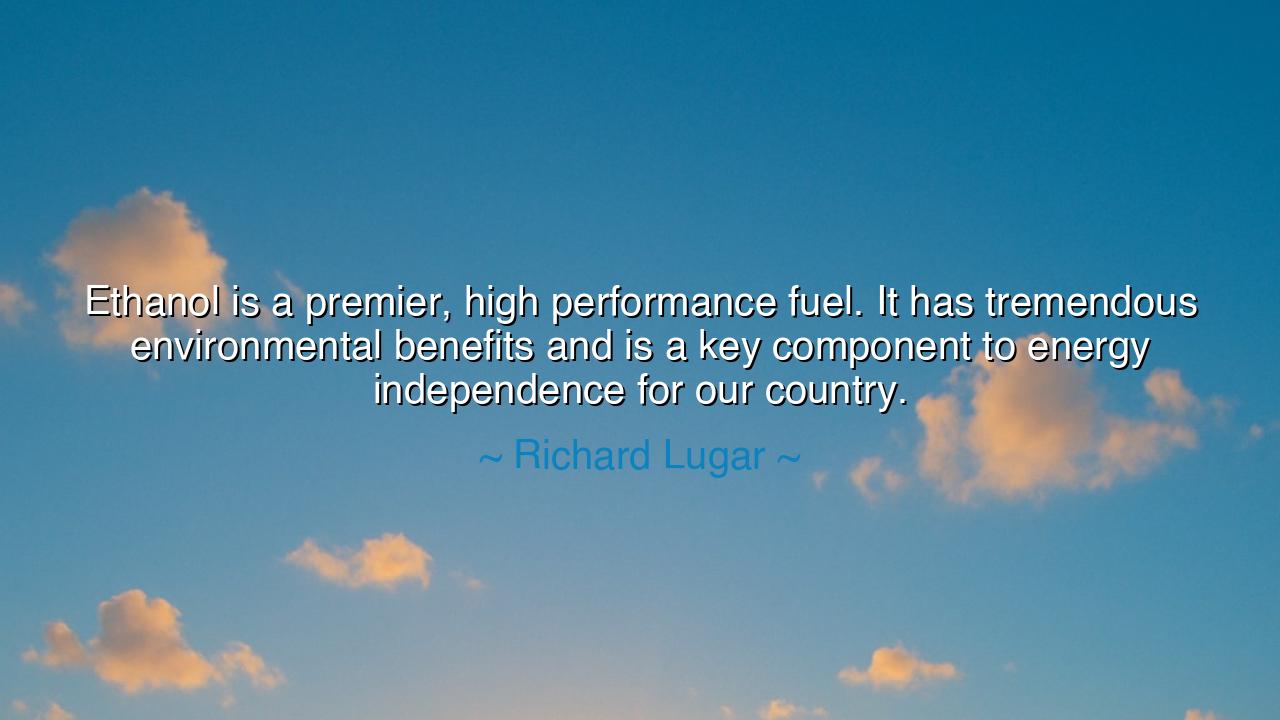
Ethanol is a premier, high performance fuel. It has tremendous
Ethanol is a premier, high performance fuel. It has tremendous environmental benefits and is a key component to energy independence for our country.






“Ethanol is a premier, high performance fuel. It has tremendous environmental benefits and is a key component to energy independence for our country.” — Richard Lugar
In these words, Richard Lugar, a statesman of uncommon foresight, speaks not merely of a fuel, but of a vision — the eternal quest of nations to stand independent and self-sustaining. His declaration is both practical and prophetic: that ethanol, drawn from the bounty of the earth, can be the bridge between nature’s gift and man’s progress. Beneath the surface of chemistry and policy lies a deeper truth — that the power of a civilization must not depend forever upon the decay of ancient worlds buried underground, but upon the renewal of life itself. Ethanol, born from corn and crop, symbolizes a harmony between labor and land, between innovation and stewardship. In Lugar’s voice resounds the call of all peoples who have sought freedom not through conquest, but through self-reliance.
The meaning of this quote rises beyond the mechanics of energy. Lugar’s words reveal the sacred link between sustainability and independence — between what a nation consumes and what it becomes. A country chained to foreign oil, he warns, is a country whose destiny is not its own. True independence, therefore, is not only political, but energetic. For as the ancients taught, a man who depends upon another for his bread or his fire is never truly free. Thus, the senator’s vision was not simply of cleaner engines, but of a nation made secure by its own hands, fueled by the harvest of its own soil.
The origin of Lugar’s conviction lies in the fields of the American Midwest, where endless acres of corn stretch beneath the sun like the promise of renewal. There, in the heartland, he saw what many in the halls of power could not — that the seeds of energy independence already grew beneath the farmer’s plow. During the turbulent decades of oil crises and global uncertainty, Lugar called upon his countrymen to see agriculture not as the past, but as the future. He understood that the same land which fed the people could also power their progress, and that to turn away from it was to remain bound to the whims of others. His belief in ethanol was thus not merely economic, but moral — a faith that innovation guided by principle could restore balance between man and the earth he inhabits.
History offers us kindred spirits who saw the same truth through different ages. Mahatma Gandhi, standing in the villages of India, spoke of swaraj — self-rule — not just in governance, but in sustenance. “Freedom,” he said, “comes not by law alone, but by spinning one’s own cloth.” What Gandhi taught through the wheel, Lugar taught through the plow: that independence begins with production, that a nation must draw strength from its own resources if it is to endure. So too did the ancient Romans build granaries before they built empires, knowing that no army marches without bread. And so, in the modern age, Lugar’s words remind us that no nation stands tall without command over its own energy.
Yet the senator’s insight does not rest upon national glory alone. His praise of ethanol also reflects a reverence for the earth — for its rhythms, its cycles, its capacity to renew. To burn the lifeblood of ancient worlds, oil and coal, is to live off death; to draw fuel from crops is to live in partnership with life. Ethanol, in this way, is more than a fuel — it is a covenant between mankind and nature, a reminder that progress need not come at the cost of balance. Lugar’s reverence for environmental benefit was not born of sentiment, but of wisdom: he knew that the earth, if abused, withholds her gifts; if honored, she multiplies them.
Still, there were those who doubted. Many laughed at his vision, saying that the power of corn could never rival the might of oil. But the wise have always been scorned before they are celebrated. Recall Nikola Tesla, mocked for chasing lightning through the air, or Copernicus, condemned for turning the heavens. Every age resists its prophets until necessity vindicates them. And so it is with Lugar, whose dream of renewable strength grows ever more vital as the old fuels run dry and the earth groans beneath their smoke.
The lesson of this quote is clear and enduring: independence begins with responsibility. To be free, whether as a person or as a people, one must learn to sustain oneself without draining the life of others or of the earth. The wise man does not wait for the world to grant him stability — he builds it from what he has. The wise nation does not wait for others to supply its energy — it creates its own. Thus, we too must seek ways to live in balance, drawing power not from exhaustion but from renewal, honoring the cycle that sustains all life.
And so, let these words be passed down as both prophecy and prayer: that humanity shall one day be independent through harmony, not domination — that our progress shall come not from burning what has died, but from nurturing what still grows. For in the field of corn, in the sunlight that ripens it, in the fuel that flows from its harvest, lies not just the promise of power, but the spirit of renewal itself — the eternal truth that to sustain others is to sustain oneself.






AAdministratorAdministrator
Welcome, honored guests. Please leave a comment, we will respond soon